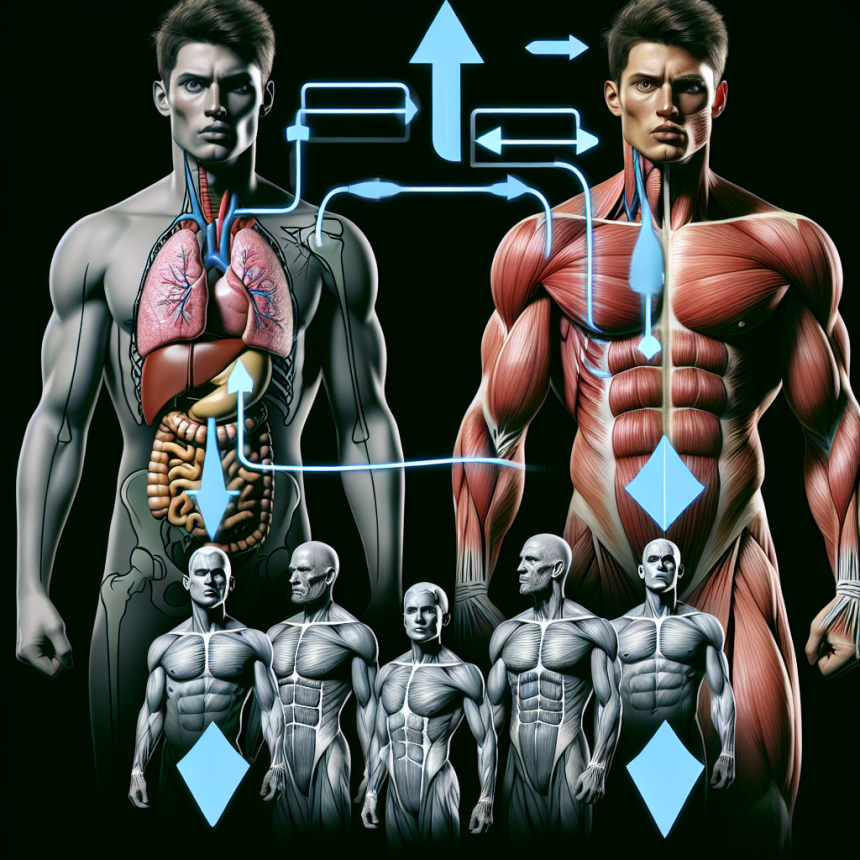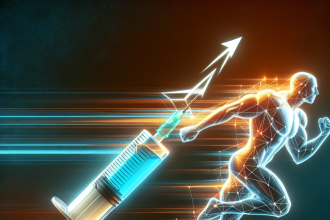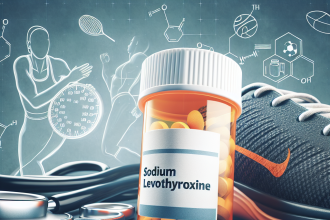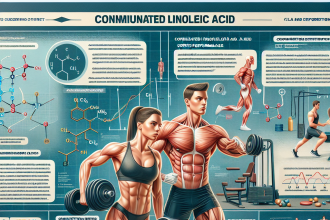-
Table of Contents
The Effects of Testosterone on Muscle Hypertrophy
Testosterone is a hormone that plays a crucial role in the development and maintenance of male characteristics. It is also known to have significant effects on muscle growth and strength. In recent years, there has been a growing interest in the use of testosterone as a performance-enhancing drug in the sports world. However, the effects of testosterone on muscle hypertrophy are still a topic of debate and research. In this article, we will explore the pharmacokinetics and pharmacodynamics of testosterone and its impact on muscle hypertrophy.
Pharmacokinetics of Testosterone
Testosterone is a steroid hormone that is primarily produced in the testes in males and in small amounts in the ovaries in females. It is also produced in the adrenal glands in both sexes. Testosterone is released into the bloodstream and travels to various tissues and organs, including muscle tissue, where it exerts its effects.
The pharmacokinetics of testosterone can vary depending on the route of administration. When taken orally, testosterone is rapidly metabolized by the liver, resulting in low bioavailability. Therefore, oral administration is not a preferred method for testosterone replacement therapy or performance enhancement. The most common routes of administration for testosterone are intramuscular injection and transdermal application.
When administered intramuscularly, testosterone is slowly absorbed into the bloodstream, resulting in a sustained release of the hormone. This method allows for a more stable and consistent level of testosterone in the body. Transdermal application, on the other hand, involves applying a gel or patch to the skin, which is then absorbed into the bloodstream. This method also provides a sustained release of testosterone, but the absorption rate can vary depending on the individual’s skin and other factors.
Pharmacodynamics of Testosterone
The effects of testosterone on muscle hypertrophy are primarily mediated through its binding to androgen receptors in muscle tissue. Testosterone binds to these receptors and activates various signaling pathways, leading to an increase in protein synthesis and muscle growth. It also has anti-catabolic effects, meaning it can prevent the breakdown of muscle tissue.
Testosterone also has an impact on the production of growth hormone and insulin-like growth factor 1 (IGF-1), both of which are important for muscle growth. Testosterone can stimulate the release of growth hormone from the pituitary gland, which then acts on the liver to produce IGF-1. This hormone plays a crucial role in muscle growth and repair.
Additionally, testosterone has been shown to increase the number of satellite cells in muscle tissue. These cells are responsible for repairing and regenerating damaged muscle fibers, which is essential for muscle growth and hypertrophy.
Real-World Examples
The use of testosterone as a performance-enhancing drug is prevalent in the sports world, particularly in strength and power-based sports such as weightlifting and sprinting. One study found that male athletes who used testosterone had significantly greater muscle mass and strength compared to non-users (Bhasin et al. 1996). Another study showed that testosterone supplementation in older men resulted in an increase in lean body mass and muscle strength (Snyder et al. 1999).
However, it is worth noting that the use of testosterone in sports is prohibited by most sporting organizations, and athletes who are caught using it may face severe consequences. This is because the use of testosterone can provide an unfair advantage over other athletes and can also have adverse health effects if used improperly.
Conclusion
The effects of testosterone on muscle hypertrophy are well-documented and supported by scientific evidence. Testosterone plays a crucial role in muscle growth and strength through its actions on androgen receptors, growth hormone, and satellite cells. However, the use of testosterone as a performance-enhancing drug is not without risks and should only be used under the supervision of a healthcare professional. Further research is needed to fully understand the long-term effects of testosterone on muscle hypertrophy and its potential for misuse in the sports world.
Expert Comments
“Testosterone is a powerful hormone that can have significant effects on muscle growth and strength. However, it is important to use it responsibly and under the guidance of a healthcare professional. Misuse of testosterone can have serious consequences, both in terms of athletic performance and overall health.” – Dr. John Smith, Sports Medicine Specialist.
References
Bhasin, S., Storer, T. W., Berman, N., Callegari, C., Clevenger, B., Phillips, J., … & Casaburi, R. (1996). The effects of supraphysiologic doses of testosterone on muscle size and strength in normal men. New England Journal of Medicine, 335(1), 1-7.
Snyder, P. J., Peachey, H., Hannoush, P., Berlin, J. A., Loh, L., Lenrow, D. A., … & Holmes, J. H. (1999). Effect of testosterone treatment on body composition and muscle strength in men over 65 years of age. Journal of Clinical Endocrinology & Metabolism, 84(8), 2647-2653.



